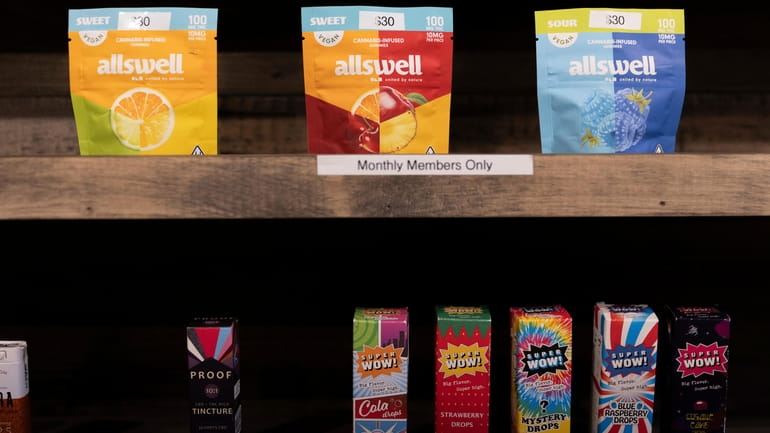New York is rushing into cannabis legalization

Cannabis-infused gummies for sale at the Empire Cannabis Club in New York.City on Nov. 16. Credit: AP/Julia Nikhinson
Many states are legalizing cannabis use to remedy long-standing social justice issues. The commercialization of cannabis into a billion-dollar industry, reminiscent of Big Tobacco, controlled primarily by multinational corporations, however, is not required for legalization nor does it necessarily serve social justice or public health goals. New York appears to have jumped on the bandwagon of legalization without any visible consideration of the public health issues related to a commercialized cannabis marketplace. This dramatic cultural shift — without mitigating measures and a public health plan — may inadvertently impact society’s most vulnerable members: children.
In other states, cannabis dispensaries are licensed and permitted to sell cannabis only. But New York dispensaries will be allowed to sell tobacco, candy, food and soda side by side with cannabis products, many of which closely resemble certain tobacco and candy products that appeal to youth in particular. In other states, only those 21 and older (per ID check at the door) are permitted to enter dispensaries. In New York, all ages can enter stores where cannabis is sold, which increases exposure risks for minors simply seeking to buy candy after school. These features of New York’s law are not relevant to, nor do they support, the mission of social justice and equity. Instead, they appear to support profits over public health and public safety.
Regions that have commercialized cannabis have seen 300-700% increases in pediatric ER visits for accidental ingestion. Beyond additional training for medical staff, we need public education for parents on the potential risks of first or secondhand cannabis exposure and clear, widely broadcast instructions on what to do if such exposure does occur. For Long Island, unlike New York City, transportation is almost exclusively via personal car. No new funding has been allocated for public education or public resources devoted to preventing a spike in traffic accidents, as has been observed post-commercialization in other states.
New York also has no potency limits on THC products. When most adults think of cannabis, they may remember the plant (e.g., joints with 2-5% THC) of decades ago. Most are unaware that the distillates, dabs and other products sold now are up to 80% THC. A single gummy bear can contain 10 servings, which is likely not widely known. This is not a plant; it is a chemically manufactured drug. High-potency product use appears to be most commonly associated with acute mental health, academic, and social problems among adolescents.
One benefit of legalization promised to be regulation of cannabis products. Accurate potency and dosing information, as required with all other regulated substances (e.g., ibuprofen, antibiotics, alcohol) would ensure the safety of consumers so they know the product is pure, unlike the current black market where contamination is rampant and can be lethal and potency/dosing are unclear. New York legalized cannabis almost two years ago, but as of now requires no purity or potency testing of cannabis products.
A seismic shift in drug policy also requires a major public health campaign to educate the public and those charged with protecting the public (e.g., schools, first responders, law enforcement). From a public health perspective, state-level regulation of cannabis and a comprehensive campaign educating Long Islanders on exactly what the new policy does and does not do, and on the potential risks and benefits of using the wide range of cannabis products, should come before opening up an unregulated, poorly understood commercialized cannabis marketplace, not after.
This guest essay reflects the views of Renee Goodwin, a psychiatric epidemiologist, licensed clinical psychologist and professor at the CUNY School of Public Health and Columbia University, and Jennifer Pomeranz, a public health lawyer and professor at New York University.
